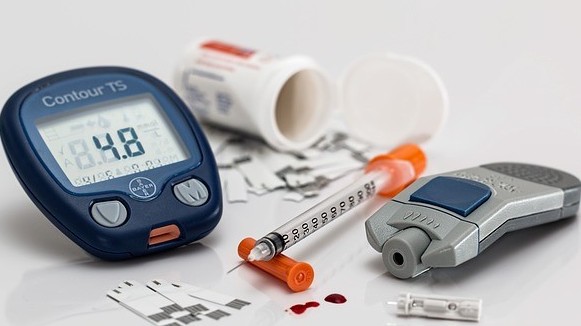Diabetes has become an epidemic in America. I’ve always had an interested in curing diabetes because I had a sister who was diagnosed with juvenile diabetes at an early age.
 When I really started to dig down into the ketogenic diet, with its recommendation of extremely low carbohydrates, I realized that the ketogenic diet and diabetes were a great fit. In fact, my neighbor, who is a doctor that started having pre-diabetes symptoms went on a very low carbohydrate diet to combat the illness.
When I really started to dig down into the ketogenic diet, with its recommendation of extremely low carbohydrates, I realized that the ketogenic diet and diabetes were a great fit. In fact, my neighbor, who is a doctor that started having pre-diabetes symptoms went on a very low carbohydrate diet to combat the illness.
Understanding Diabetes
Before you understand how the ketogenic diet impacts the person with diabetes, it is important to understand Diabetes. Diabetes is a metabolic disorder where the pancreas does not produce the required amount of insulin.
Insulin is a hormone. It’s made in the beta cells of the pancreas, and one of its main roles is to help regulate, or control, your blood sugar. When there’s enough insulin in the body, it helps to keep your blood sugar from going too high. In people who don’t have diabetes, blood sugars are very carefully and tightly controlled, staying within a safe and healthy range.
After a person without diabetes eats a meal or a snack, the pancreas releases insulin. The insulin then signals muscle, fat, and liver cells in the body to absorb glucose (sugar) from the bloodstream to be used for energy. In this sense, insulin is like a key that unlocks the doors of the cells to allow glucose to enter. You can also think of insulin as a “storage” hormone, since when there’s more glucose than the body needs, insulin helps the body store that excess glucose in the liver to be used at a later time. Insulin also signals the liver to stop releasing glucose into the bloodstream.
Insulin also helps shuttle amino acids (from protein digestion) and fatty acids (from fat digestion) into cells.
Carbohydrates turn into sugars when they are consumed. This raises the blood sugar higher. Without enough insulin in the blood stream to control the blood sugar, the blood sugar remains dangerously high.
Carbohydrates and Diabetes
The macronutrient that raises the blood glucose the most are carbohydrates. Therefore, keeping the consumption of carbohydrates as minimal as possible is the goal of most diabetics. It is also important for diabetics to consume foods that are natural and have the necessary micronutrients and complete proteins to support activities of daily living, such as exercise and work.
The ketogenic macronutrient profile requires you to consume fewer than 20 grams of carbohydrates per day, and have a ratio of 75% fats and 20% protein. With this macronutrient profile, many diabetics have seen a significant improvement in blood glucose control. This is in part due to the fact that they are consuming so few macronutritents that will raise their blood glucose levels.[easyazon_image align=”right” cart=”n” height=”500″ identifier=”1943721068″ locale=”US” src=”https://images-na.ssl-images-amazon.com/images/I/51H-8ofM6ML.jpg” tag=”mcurle08-20″ width=”333″]
Nutritional Ketosis vs. Ketoacidosis
The ketogenic diet will keep a person with diabetes (or anyone really) in a state of nutritional ketosis. Many diabetics are warned about ketoacidosis and there is some confusion surrounding the two. Ketosis is not a life-threatening condition. However, Ketoacidosis, which is a complication of type 1 diabetes can be.
Ketoacidosis results from dangerously high levels of ketones and blood sugar. When this happens, your blood becomes very acidic. It can change the normal functioning of internal organs such as the liver and kidneys.
There are a few things that can lead to Diabetic Ketoacidosis. These include an improper diet, not taking an adequate dose of insulin, or consuming alcohol when you have been fasting.
Diabetic ketoacidosis is when the body has high levels of ketones and high levels of blood sugar. This can be prevented by regular blood testing and insulin injections.
When you consume a low-carbohydrate diet, your body will produce ketones. This is known as ketosis. Ketones are a chemical your body produces when it burns stored fat.
Ketosis is the natural results of a low carbohydrate diet that instructs the fat cells to release the fat and instructs the liver to convert that fat into ketones. Ketones, such as actocetate and beta-hydroxybutyrate, are tiny energy molecules clipped from long fatty acids to replace a portion of the glucose requirements of many key organs, especially the brain. Over time, the body becomes metabolically flexible in its ability to utilize glucose, ketones and fat instead of just glucose and fat for fuel.
Being able to utilize ketones for fuel is important to those with Diabetes who may experience hypoglycemia since ketones are capable of supplying the brain with fuel when the glucose in the body is temporarily low.
Reducing Inflammation
A low carbohydrate ketogenic diet is known to be anti-inflammatory. It improves cardiovascular risk factors in people with metabolic syndrome. Keeping the body in ketosis means that the body is utilizing fat instead of sugar for energy. Sugar is inflammatory.
Excess sugars in the body leads it to:
- Produce higher amounts of insulin
- Raise inflammatory markers
- Produce free radicals, which are molecules which inflame blood vessel linings. They stimulate the body’s immune response.
- Trigger chronic disease.
Consuming a ketogenic diet, which is very low in sugars and carbohydrates, halts the insulin spikes that happen from unregulated sugar levels. These raise the blood sugar and create inflammation in the body.
During ketosis, ketone bodies are released. The most important one that gets released is beta-hydroxybutyrate. Research has demonstrated that beta-hydroxybutyrate can block what’s known as the NLRP3 inflammasome, which is an immune system receptor linked to inflammation.
The NLRP3 inflammasome will react quickly to threats to the body. These threats could be infections, toxins or too much glucose. This can be helpful, however when this receptor is activated too much, we become constantly exposed to inflammation. This happens when we eat inflammatory foods everyday.
This is one reason that people experience anti-inflammatory effects when they are strictly following a ketogenic diet. They are consuming fewer inflammatory foods as well as triggering ketosis and releasing NLRP3 into the body.
Carbohydrates and Inflammation
Now, let’s examine how eating carbohydrate rich foods relates to pain and inflammation in the body — and how ketosis can help to remedy this.
After you consume something with excess carbohydrates, which get broken down to sugars, the blood glucose levels remain higher than usual. The constant consumption of high sugar foods triggers a build up in the blood. This will create inflammation. Chronic inflammation will lead to issues such as insulin resistance and Type 2 Diabetes.
The excess sugars that are in the body will also be stored as fat.
This process can happen when you eat too much protein as well. The body will start to break down the protein into glucose. This process is called gluconeogenesis. For this reason, the ketogenic diet, is characterized with low carbohydrate and moderate protein. The ketogenic diet is far better than a standard low carbohydrate diet for addressing inflammation.
Conclusion
The ketogenic diet helps Diabetics by reducing the carbohydrate levels that they are consuming. This reduces their need for insulin. As their body begins to go into a state of nutritional ketosis, the increased levels of NLPR3 help to reduce the inflammation in their body. Reducing inflammation in the body enables it to start to heal itself. The ketogenic diet takes the body out of a constant state of inflammation and allows of healing. 
<<Click Here for a FREE Ketogenic Cookbook to get started on the Keto diet>>

What we eat plays a big part in how our body deals with many health issues. I have heard a lot lately about the keto diet but I didn’t know there were so many benefits for those with diabetes. I am going to share your site and this article with my family members. I am sure they will appreciate this info. Thanks so much!
Thanks for the compliment. Best wishes to you and your family!
Wow! You made the complex very understandable. Thank you!
With so many family and friends with diabetes (as well as just plain sickly) I’m gonna have to share your site with them. And I know my wife will be very interested in your cookbook.
Thanks again.
Thanks for the compliment!
Hi Melinda, this is a great read and a very informative post, especially for those suffering from this common illness. Sugar really is poison when too much is eaten. Most people have had their daily quota before they even leave their house in the morning!
I don’t eat any refined sugars anymore, and I watch my intake of all carbs in general and have masses more energy for it. Moderation is key I think.
Thanks, although, I think sometimes people use the “moderation is key” justification to continue with their bad habits. The ketogenic diet does not believe you should eat a moderate amount of carbohydrates, it reduces it to less than 20 carbohydrates, a minimal amount. Carbohydrates can be very addictive and it will be difficult to maintain an moderate amount.
Hello Melinda, wonderful post that you have created. I always wanted to more about diabetes, and how to cope with it, thanks a lot!!! Taking care of you and your body can give you a long life span. Continue to work hard!!!
Thanks for your comment. I’m glad you enjoyed this post. Best wishes to you as well!